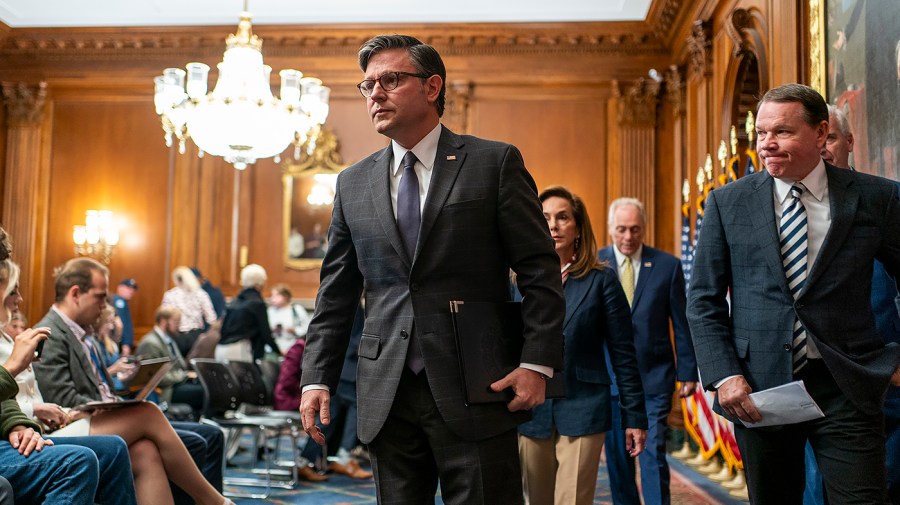Republicans grapple with shutdown – and why more are blaming the GOP

Republicans are grappling with public polls showing the public places more blame on them, rather than the Democrats, for the shutdown, even as they argue they have the moral high ground in the shutdown fight.
Speaker Mike Johnson (R-La.) and Republicans stress that they put no partisan poison pills in a GOP-crafted, House-passed stopgap to fund the government through Nov. 21. Democrats in the Senate have repeatedly blocked that bill as they demand that Republicans first negotiate with them on health care issues, particularly on enhanced Affordable Care Act subsidies expiring at the end of the year.
Johnson this week pointed to news coverage about the government shutdown while arguing Democrats are more to blame.
“If the Republicans were responsible for this shutdown, that would lead the news in every mainstream media outlet every single night, it would be top fold of every newspaper, on the front page every single day,” Johnson said in a Wednesday press conference, asserting that the press was trying to “give cover to the Democrats who’ve caused this.”
“The American people are not stupid, and we’re in here every day appealing to their common sense and relating the facts,” Johnson said.
Yet poll after poll finds that slightly more Americans think Republicans are to blame for the shutdown than who think Democrats are at fault.
An Oct. 15-20 Reuters/Ipsos poll found 50 percent of adults blaming Republicans in Congress for the shutdown, and 43 percent blaming Democrats in Congress.
An Oct. 16-20 Quinnipiac poll found 45 percent of registered voters said congressional Republicans were more to blame for the shutdown, compared to 39 percent saying congressional Democrats were more to blame.
And an Oct. 17-20 Economist/YouGov poll found 31 percent of adults put the blame on Democrats and 39 percent blame Republicans. That poll also found 45 percent saying that Democrats should hold out for changes in health care funding before agreeing to end the shutdown, compared to 32 percent who said they should not.
That public sentiment has only encouraged Democrats to dig in on the stalemate.
“The reality is they control the House, the Senate, and the presidency. They’ve taken this my way or the highway approach since the very beginning of Donald Trump coming back into office, and of course it’s understandable that they are bearing the brunt of responsibility. And they’ve been unwilling to negotiate,” House Minority Leader Hakeem Jeffries (D-N.Y.) said on MSNBC when talking about the public polling.
In the face of public polling, Republicans insist they are the more reasonable party by putting forward a “clean” continuing resolution (CR).
“I think when you when you look at who’s reasonable, it’s Republicans,” Rep. Adrian Smith (R-Neb.) said Friday when asked about that public sentiment. “A clean CR is what we’ve done, is what happened, I think, 13 times during the Biden administration.”
Yet hardline moves from Republican leaders in the shutdown fight have stoked controversy.
Johnson has kept the House out of session during the shutdown, arguing the chamber has already done its job. He has repeatedly rebuffed suggestions that the House could be doing other work, saying that appropriators are still working to prepare regular funding bills even though the House is not in session. Democrats, meanwhile, accuse Republicans of being on “vacation” during the shutdown.
The Speaker has refused to swear in Rep.-elect Adelita Grijalva (R-Ariz.) while the House is out of session during the shutdown, leading to accusations that he is doing so to block a discharge petition to force a vote on a bill to release files about the late sex offender Jeffrey Epstein, which Johnson has denied. Arizona’s Attorney General Kris Mayes (D) filed a lawsuit over Grijalva’s swearing-in thisweek.
Smith, who presided over a pro forma session of the House on Friday, noted that leaders have the flexibility to call members back. He did not suggest that he saw any reason for GOP leaders to shift their tactics.
“I don’t see any sign that we need to change what has been on the calendar,” Smith said.
Even though voters in polls are putting more blame on Republicans than Democrats for the shutdown, President Trump’s approval rating isn’t taking a hit as the funding lapse is in its fourth week. In fact, his poll numbers have gone up a bit.
Decision Desk HQ’s polling average shows that Trump’s approval rating was 44 percent on Sept. 30 before rising to 46.2 percent on Oct. 23.
Trump has been largely disengaged from the shutdown fight, as major international matters have been his focus in October. He oversaw an Israel-Gaza ceasefire deal, hosted Ukrainian President Zelensky in the White House, talked to Russian President Putin and will spend the next week on a major Asia trip.
The president has declined requests from Senate Minority Leader Chuck Schumer (D-N.Y.) and Jeffries to meet to talk about their health care demands as the shutdown drags on.
“I will only meet if they let the country open,” Trump told reporters this week.